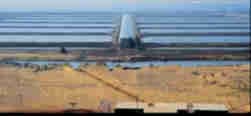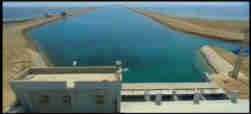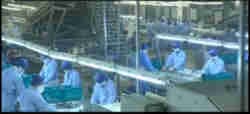
However, a project at Al Lith on the Red Sea Coast has managed to develop fully integrated prawn farms, producing more than 14,000 tonnes of white prawns a year.
The National Prawn Company has focused on the sustainability of the system, with water management a key factor in the management of the farms.
The ponds are fed with the waters of the Red Sea through a pumping station which raises the water 2.5 metres to the farms. The water is continually changed in the farms during the day.
The company says that every aspect of production from the hatchery to the pond through to the cold store is monitored and traced.
The company is in the process of expanding having already opened 10 farms with 28 ponds each. Another 13 farms of equal size are being built.
The production methods are extensive and according to the NPC communications director Laurence Cook the company ensures that the stocking densities are at a level to give the prawns space. The production system uses no antibiotics and the biosecurity system takes daily samples that are checked in the company's labs.
The water outflows are also checked daily and after harvesting, the water is drained from the ponds, which dry out in the sun before they are refilled with the water from the Red Sea and restocked.

Not only are the waters tested daily, but they also have to pass government standards for water quality.
The production starts with the brood stock of white prawns from which the company can produce up to 10 million young larvae a day in its dedicated spawning, and hatching sections.
From the larvae rearing units, the young prawns are taken to grow out ponds with a low stocking density.
The low stocking helps to maintain the disease free nature of the ponds. The prawns are fed four times a day and the company is currently introducing a sonar tracking system in the ponds to measure the stocking densities and in this way manage the feed regimes.
The feed has been developed by the company's own nutritionists and is produced in its own fully automated feed mill. The company is developing a system using sonar to measure the stocking densities of the ponds so that it can optimise its feeding and manage the fish stocks.
Then growing time takes about 180 days and the prawns are harvested at night using methods that cause the least possible stress. From the harvest the prawns are in the cold store within seven hours.

The company has invested in a state of the art processing plant that can process 80 tonnes of prawns a day, from block frozen, to individually quick frozen product to ready to eat products. Saudi Arabia is the company's only direct retail market with modifies atmosphere packed products.
The plant follows a strict HACCP regime.
The company supplies product around the world to countries including Japan, Korea, Australia, Singapore, Hong Kong, Egypt, the UAE, Spain, France, the United Kingdom and the United States. The company is expecting shortly to receive the BRC certification for its production methods that will improve its access on international markets.
On the domestic market, Saudi Arabia is the National Prawn Compnay's only direct retail market with a range of modified atmosphere packaged products due to be launched this month (May).
As part of the sustainability programme, NPC is ensuring the protection of the environment by developing mangrove plantations.
The company is also developing other aquaculture products including fish with a land based farm designed to produce 5,000 tonnes of Greater Amberjack.
The hatchery is nearing completion and is expected to have its brood stock introduced in June this year.
The company has also started farming sea cucumber with sales expected to start towards the end of this year or the start of 2011.
Another area of development has been the production of algae in the ponds.
This is in the early stages and is designed to be used for feed or the production of beta carotene.




